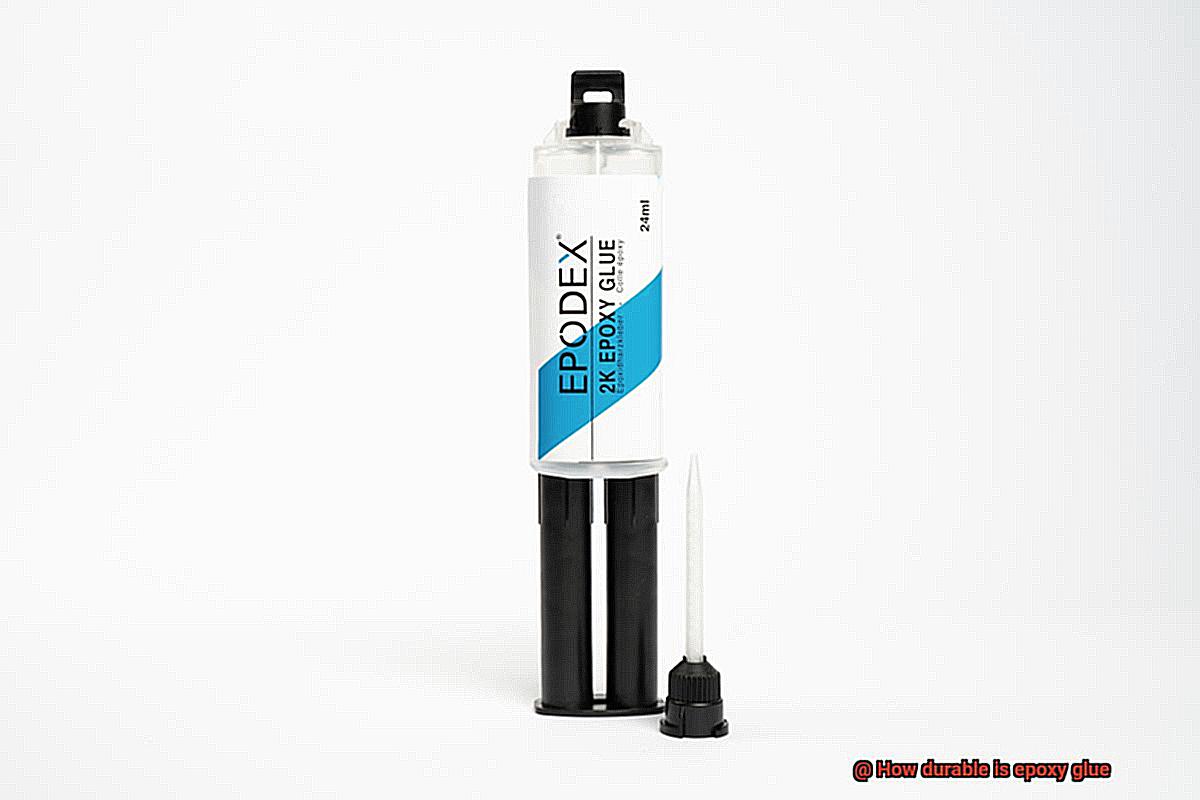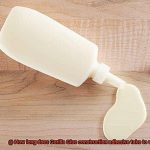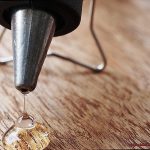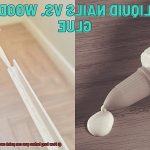Have you ever pondered the true strength of epoxy glue?
Whether you’re a DIY aficionado or a seasoned craftsman, having an adhesive that can withstand the test of time is crucial. Thankfully, epoxy glue has earned quite the reputation as one of the most resilient adhesives out there.
Its durability is no joke, with the potential to last for decades on end. This makes it a top choice for all sorts of applications.
From battling extreme weather conditions to shrugging off exposure to chemicals and water, epoxy glue fearlessly stands its ground. In this blog post, we’ll take a deep dive into the captivating realm of epoxy glue’s durability and explore how it fares under various environmental circumstances.
So, fasten your seatbelts and prepare to plunge into the world of unyielding adhesives.
Bonding Strength of Epoxy Glue
Contents
When it comes to adhesive strength, epoxy glue stands out from the rest. This versatile adhesive is renowned for its exceptional bonding power, making it a go-to choice for professionals and DIY enthusiasts alike. In this article, we delve into the factors that influence the bonding strength of epoxy glue, providing you with a comprehensive understanding of its durability.
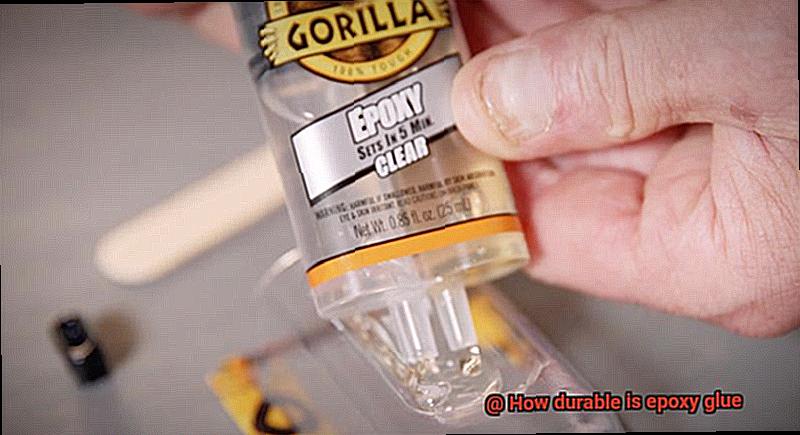
The Perfect Mix:
Epoxy glue consists of two components – the epoxy resin and the hardener. When these components are combined in the correct ratio, a chemical reaction is triggered, resulting in a robust bond. It is crucial to follow the manufacturer’s instructions carefully to ensure optimal mixing and bonding strength.
Curing Time:
The curing process plays a significant role in determining the bonding strength of epoxy glue. This process involves allowing sufficient time for the chemical reaction to occur and the adhesive to harden. Curing times can vary depending on the specific epoxy glue product, ranging from a few minutes to several hours. Patience is key to achieving maximum bonding strength.
Versatility at its Best:
One of the standout features of epoxy glue is its ability to bond different materials together. Whether you need to join metal, plastic, wood, or ceramics, epoxy glue provides a reliable solution. Its versatility makes it suitable for a wide range of applications, from repairing household items to industrial projects.
Testing the Strength:
To assess the bonding strength of epoxy glue, various testing methods are employed. Shear testing and tensile testing measure the force required to break the bond created by epoxy glue. These tests consistently demonstrate that epoxy glue often exceeds the strength of the materials being bonded.
Durability in Challenging Environments:
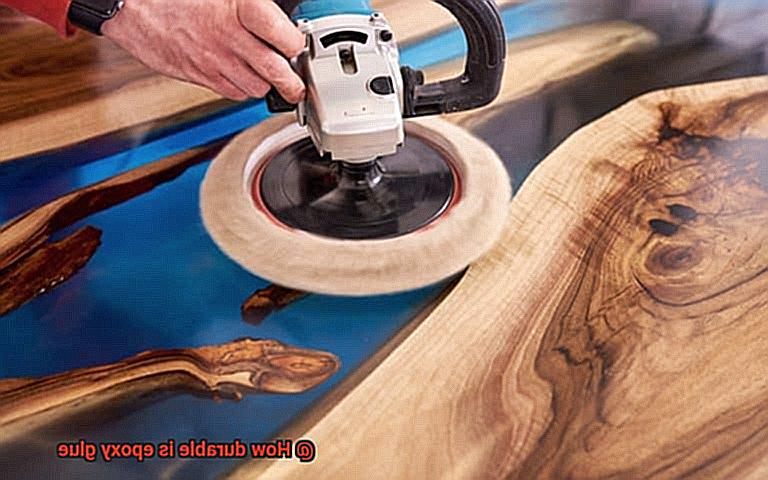
Epoxy glue’s durability extends beyond its impressive bonding strength. It exhibits excellent resistance to temperature fluctuations, moisture, chemicals, and even impact or vibrations. This makes it an ideal choice for both indoor and outdoor applications, as well as in demanding industries.
Surface Preparation:
To achieve optimal bonding strength, proper surface preparation is crucial. Ensure that the surfaces to be bonded are clean, dry, and free from any contaminants that may hinder the adhesive properties of epoxy glue. A well-prepared surface sets the foundation for a strong and enduring bond.
Durability in Environmental Factors and Chemicals
Epoxy glue is renowned for its remarkable ability to withstand the harshest environmental factors and chemicals, ensuring unparalleled durability in any bonding project. Let’s delve into the details and explore how epoxy glue can conquer even the most challenging conditions.
First and foremost, let’s tackle environmental factors. Epoxy glue is an unrivaled champion when it comes to extreme temperatures. Whether you’re working under scorching heat or freezing cold, this adhesive will never let you down. Picture yourself confidently crafting an outdoor masterpiece under the blazing sun or operating in an industrial setting with fluctuating temperature conditions – with epoxy glue, your bond remains unyielding.
But wait, there’s more. Epoxy glue also scoffs at moisture and humidity. Unlike other adhesives that crumble in the presence of water, epoxy glue stands tall. It won’t weaken or degrade when exposed to high levels of humidity or even direct contact with water. Bid farewell to fears of mold or mildew growth sabotaging your bond – epoxy glue has your back.
Now let’s turn our attention to chemicals. Epoxy glue is a true warrior against acids, bases, solvents, and oils. It defiantly confronts these common chemicals without flinching. So whether you find yourself working with potent cleaning agents or harsh solvents, rest assured that your bond will remain unyielding.
To ensure you harness the full power of epoxy glue, proper surface preparation is key. Before applying the adhesive, ensure that the bonding surfaces are immaculately clean, bone-dry, and free from any contaminants or debris. This meticulous attention to detail guarantees a robust bond that will stand the test of time.
And remember, follow the manufacturer’s instructions diligently regarding application temperature and curing time. These guidelines are critical for achieving peak bond strength and maximum durability. Trust me on this – cutting corners when it comes to epoxy glue is simply not worth it. Its exceptional performance is worth every second of precise application.
Impact and Vibration Resistance
Epoxy glue is here to save the day with its exceptional resistance to impact and vibration. Whether you’re a DIY enthusiast or a professional in need of a reliable bonding solution, epoxy glue is the superhero you’ve been waiting for.
The Science Behind the Strength:
Epoxy glue’s secret lies in its unique chemical structure. It combines a resin and a hardener, creating a dynamic duo that undergoes a chemical reaction called curing. This reaction forms a rigid molecular structure, like an impenetrable suit of armor, ready to withstand external forces without flinching.
Solid Adhesion for Unbreakable Bonds:
Another superpower of epoxy glue is its incredible adhesion. It forms an unbreakable bond with different materials, distributing impact forces across a larger surface area. Even when faced with a powerful blow, your bonded components will stay intact, thanks to the superior strength and resilience of epoxy glue.
Vibrations Be Gone:
But what about vibrations? Fear not. Epoxy glue has got you covered. It acts as a dampening material, absorbing energy from vibrations and preventing significant harm to your glued surfaces. It’s the perfect choice for machinery or equipment exposed to constant vibrations in automotive or industrial settings.
Tensile Strength: A Force to Be Reckoned With:
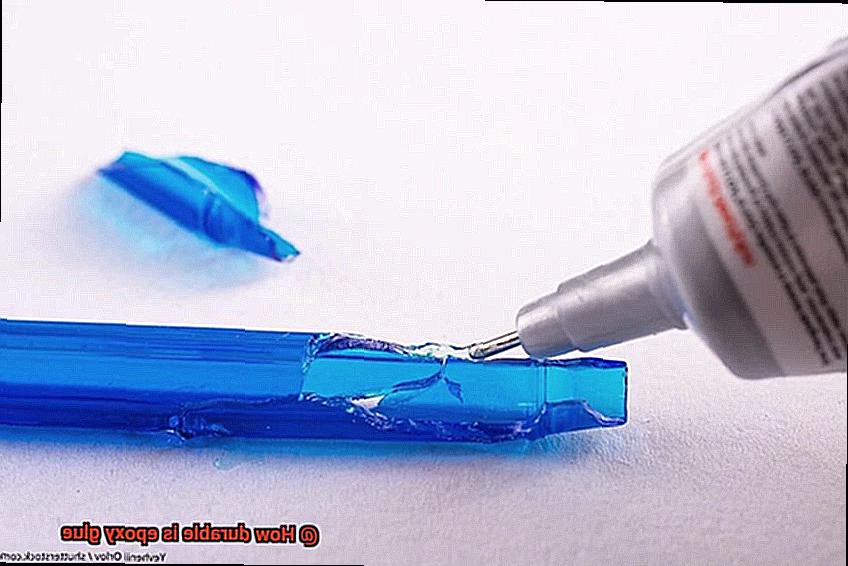
Let’s not forget about the impressive tensile strength of epoxy glue. It can handle pulling or stretching forces without breaking, offering unmatched durability. So go ahead and put it to the test – it won’t let you down.
Temperature Stability
Temperature stability is a critical aspect when it comes to the performance of epoxy glue. It refers to the ability of the glue to maintain its effectiveness under different temperature conditions. This characteristic is vital in ensuring the long-term durability and adhesive properties of epoxy glue.
When it comes to high temperatures, epoxy glue is truly remarkable. It can withstand a wide range of heat, from scorching temperatures of 150°F to 600°F (65°C to 315°C), depending on the specific formulation. This means that even in the hottest environments, our epoxy glue remains unfazed. In fact, higher temperatures can even accelerate the curing process of epoxy glue, making it stronger and more durable.
But don’t underestimate epoxy glue’s resilience in freezing temperatures either. Most epoxy glues can handle freezing conditions with ease, without losing their adhesive properties. However, for extreme cold environments, it’s always advisable to choose an epoxy glue specifically designed for low-temperature applications.
However, rapid temperature changes can pose a challenge for epoxy glue. Just like your body reacts when going from a sauna to an ice bath, extreme temperature fluctuations can stress the bonded surfaces and compromise the adhesive bond. Therefore, it’s crucial to select an epoxy glue that offers good thermal stability and can handle these wild temperature swings.
In industries like aerospace or automotive, where extreme temperature conditions are common, epoxy glues with exceptional temperature stability are essential. These special formulations are like superheroes in the world of adhesives, capable of withstanding cryogenic temperatures as low as -452°F or -269°C and scorching hot engine compartments without breaking a sweat. They often contain special additives or fillers that enhance their thermal stability and resistance to thermal cycling.
Quality Variations in Different Brands
When it comes to selecting the perfect epoxy glue for your project, quality is the key ingredient. After all, you wouldn’t want your meticulously crafted masterpiece to crumble at the first sign of pressure. But with a multitude of brands available, how can one ascertain their reliability? Let’s delve into the world of epoxy glue and explore the intriguing quality variations that exist between different brands.
The Importance of Brand Reputation:
Brand reputation forms the backbone of any product, and epoxy glue is no exception. Renowned brands have earned their stripes by investing heavily in research and development, resulting in top-notch products. These brands leave no stone unturned in ensuring that their epoxy glues are formulated using premium-quality materials and undergo rigorous testing to meet and exceed industry standards.
Beware of Bargain Brands:
The allure of cheaper or lesser-known brands may be hard to resist, but proceed with caution. These brands may be tempted to cut corners during the manufacturing process, sacrificing the integrity of their epoxy glues. Consequently, these lower-quality adhesives fail to deliver long-lasting bonds, leaving your project precariously held together.
Identifying Reliable Brands:
So, how does one navigate through this sea of choices to find reliable brands? Here are some valuable pointers:
- Read Customer Reviews: Delve into the treasure trove of honest customer reviews to gain invaluable insights into the performance and durability of various epoxy glue brands.
- Seek Recommendations: Consult professionals or experienced users in your field who have already tested multiple brands. Their firsthand experiences can guide you towards trusted options.
- Check for Certifications: Keep an eagle eye out for certifications or quality labels on the packaging. These symbols serve as a testament to the product’s thorough testing and adherence to industry standards.
Advantages of Using Epoxy Glue
It’s time to consider using epoxy glue. This powerful adhesive has a multitude of advantages that make it the go-to choice for professionals and DIY enthusiasts alike.
First and foremost, epoxy glue offers exceptional bonding strength. It forms a strong and durable bond between different materials, including metals, plastics, wood, ceramics, and more. No matter what you’re working on, epoxy glue will ensure a secure hold that will withstand the test of time.
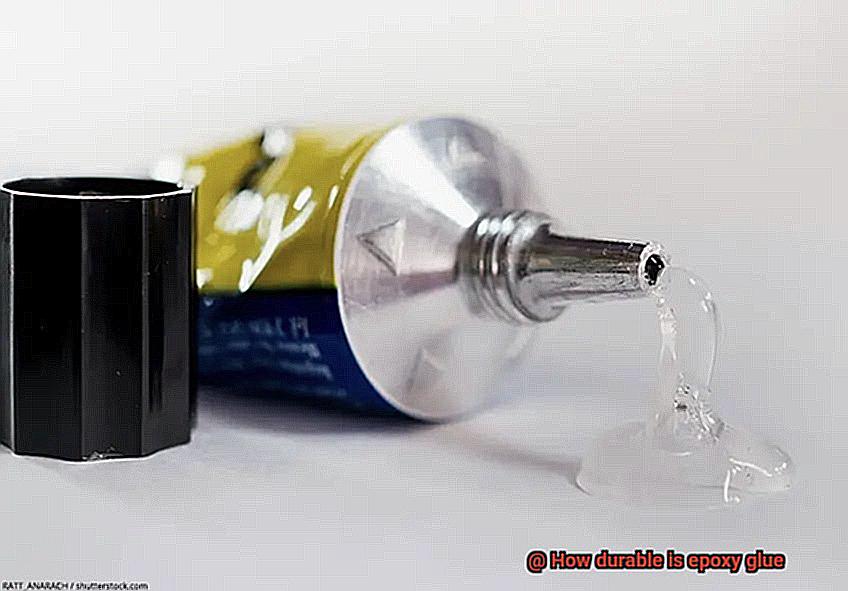
Versatility is another key advantage of epoxy glue. Unlike other types of adhesives, epoxy can be used on a wide range of surfaces, including porous and non-porous materials. So whether you’re working with glass, concrete, or even fabric, epoxy glue has got you covered.
But the benefits don’t stop there. Epoxy glue is also resistant to chemicals and moisture once it’s cured. This means that your bonded surfaces will be protected from the damaging effects of moisture and various chemicals. So if you’re tackling a bathroom repair or an outdoor project, epoxy glue is the way to go.
One of the standout features of epoxy glue is its excellent gap filling abilities. It can easily fill in gaps or spaces between two surfaces, making it perfect for bonding uneven or irregularly shaped objects. The ability to fill gaps ensures a tight and secure bond, even in challenging applications.
Temperature and impact resistance are also advantages of epoxy glue. It can withstand high temperatures and maintain its strength under extreme conditions. So if you’re working on something that will be exposed to heat or mechanical stress, epoxy glue is the reliable choice.
And let’s not forget about the long shelf life of epoxy glue. Unlike some adhesives that dry out or become unusable over time, epoxy glue can be stored for an extended period without losing its effectiveness. So you can keep it in your toolbox or storage and have it ready whenever you need it.
Last but not least, epoxy glue is relatively easy to use. Most epoxy glues come in two parts, a resin and a hardener, which need to be mixed together before application. Once mixed, the glue typically has a relatively long working time, allowing you to position and adjust the pieces before it sets. And with clear instructions provided by many epoxy glue brands, even beginners can achieve professional results.
Considerations When Choosing the Right Epoxy Glue
When choosing the right epoxy glue, there are several important factors to consider. These considerations will help you select a product that is suitable for your specific needs and ensure that you achieve the best results. Here are some key factors to keep in mind:
- Bonding Strength: The bonding strength of epoxy glue is a crucial consideration. Different epoxy glues have varying strengths, so it’s important to choose one that matches the materials you’ll be bonding. If you’re working with heavy-duty materials like metal or stone, opt for an epoxy glue specifically designed for these materials.
- Curing Time: Consider the curing time of the epoxy glue – how long it takes to fully dry and reach its maximum strength. Faster-curing epoxy glues offer convenience, but keep in mind that they may sacrifice some level of durability compared to slower-curing options.
- Temperature Resistance: Will your project be exposed to extreme temperatures? If so, choose an epoxy glue that can withstand these conditions without compromising its durability. Look for temperature-resistant options to ensure a long-lasting bond.
- Chemical Resistance: Some projects require epoxy glue that can resist exposure to chemicals or solvents. If your bonded materials will come into contact with substances that could weaken or deteriorate the adhesive, make sure to select an epoxy glue with excellent chemical resistance properties.
- Flexibility: Is your project subject to movement or vibrations? If yes, opt for a flexible epoxy glue that can withstand stress without cracking or breaking. Flexibility is crucial in maintaining the durability of the bond.
- Water Resistance: Finally, if your project involves exposure to moisture or water, choose an epoxy glue with outstanding water resistance properties. Water can weaken the bond, so it’s important to select a product that can withstand wet conditions.
In addition to these factors, it’s also important to consider the application method and any specific instructions provided by the manufacturer. Following the recommended application process will help ensure the best results.
XObmZIbHOzY” >
Also Read: What Is the Best Epoxy Glue?
Conclusion
In conclusion, epoxy glue is a powerhouse adhesive that stands the test of time. Its durability is unmatched, making it a top choice for professionals and DIY enthusiasts alike.
The bonding strength of epoxy glue is unparalleled. With its unique combination of epoxy resin and hardener, it forms a robust bond that often exceeds the strength of the materials being joined. From metal to wood to plastic, epoxy glue can seamlessly unite different materials together.
But durability goes beyond bonding strength. Epoxy glue laughs in the face of temperature fluctuations, moisture, chemicals, impact, and vibrations. It fearlessly tackles any indoor or outdoor project and thrives in demanding industries.
Preparation is key when using epoxy glue. Cleanliness and dryness are essential for achieving optimal bond strength. By ensuring surfaces are free from contaminants, you lay the groundwork for a strong and enduring connection.
Extreme temperatures? No problem. Epoxy glue scoffs at scorching heat or freezing cold. Water exposure or harsh solvents? It’s not even fazed. This adhesive remains steadfast in the face of adversity.
And let’s not forget about impact and vibrations. Epoxy glue’s chemical structure creates a rigid molecular framework that disperses impact forces across a larger surface area. It acts as a shield against vibrations too, damping them out like a pro.
When selecting epoxy glue, consider factors like bonding strength, curing time, temperature resistance, chemical resistance, flexibility, and water resistance. Following manufacturer instructions diligently ensures peak bond strength and maximum durability.
All in all, epoxy glue is an unwavering adhesive that offers exceptional durability for countless applications.

